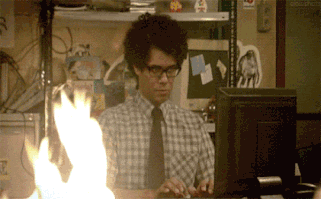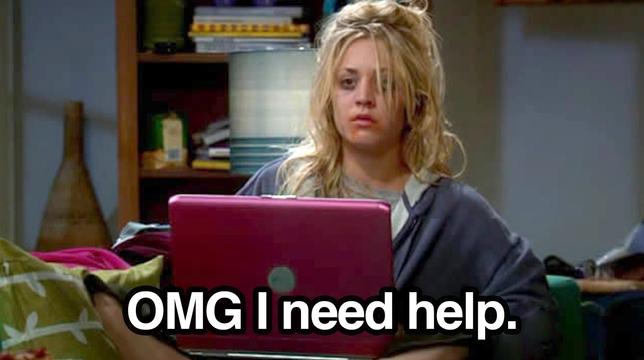 This year’s Undergrad Novelist is a little late, mostly because this past semester, this novelist got to graduate for the first time! Out of community college and onto one school for a major in English with a concentration in Literary Studies- and a minor in French! Getting here hasn’t been easy though, and 2016 was fraught with the dangers of the Sophomore Slump. But before we talk about the Slump, let me talk about, in timeline points, why I ended up there in the first place. Over the course of 2015, both my grandparents and my close uncle passed away. Grief consumed the year and drove my writing to halt around that May. During the fall semester, I find myself in a Psychology class with a borderline unstable professor who is in the midst of losing her own mother to cancer. The class derails midway through, and although I performed well throughout the class and formed a good repour with her. I am disregarded and called an artsy, depressed “freak” in front of the class. I later discover she has been trash-talking me behind my back to other students. I am crushed, and she gets fired. Beginning in 2016, I’m hired onto a new job in publishing. I’ve blogged at length about the domino effect this had on my life- the lack of time, lack of writing, and unusual experiences that came from these eight months. My writing and grades both began slipping during this period, and that’s when I worried I was heading in a bad direction. The Sophomore Slump is this mythical event before or around the point when you hit 60 hours in college. It is fraught with de-motivation, doubt, and bad habits. The factors I mentioned above matter, but more often than not, this is because Sophomore Year comes with the last few classes before they settle on a major; the pressure to choose something and change feels somewhat immense. It can (and probably will) happen and although it is soul-sucking in the moment, there are a few great lessons to be gained from the experience. Such as… Don’t Panic (But Also Don’t Slack) I mostly write this as a self-reminder, because I did just this. I panicked about my grades, and given my problems with anxiety and stress, this did me no favors. Remember that when we panic, we can often make a situation more worse than it actually is. In the event of a bad grade and bad writing patch, it’s best to remain calm and collect one’s self. By the same token, don’t fall into the other end of The Slump and slack off (or even give up, which I’ll bring up next). Failure in the moment makes slacking very tempting, but it will only lead to larger problems in the long run and more things you haven’t done. I know how hard it is to do badly, but remember that doing badly doesn’t mean you will do badly forever. Avoid the Path of Least Resistance Speaking of slacking, it’s at some point during the Slump that you may get an idea that school isn’t for you. In the heat of bad grades and stressful schedules, I had surmised that my best goal was to go part-time (or even drop out) and move to Berlin/New York with my then-publishing job. There’s a really long story behind the results that came from that, but let’s just say I’m glad I stayed in college. Really glad. And chances are, you can stay as well. Avoid the paths of well-meant jobs and shorter degrees if that’s not actually what you want from your college career. Advisors are there for a reason, and there is so much more to offer in university past Junior Year. Take a weird course, plan to study abroad, find a way into clubs or honors… these things can make the transition through a rough patch more bearable, and challenge you in ways straight-forward college life might not. Don’t overload yourself, but certainly try to find something fresh to do. Keep Faith in Your Creative Work Focusing on writing during college can be hard if you don’t know how to manage your time, and sometimes, when one thing is bad, then everything feels bad along with it. School and writing are part and parcel for me; one fuels the other. So, when I started having trouble in school, I watched the same problems consume into my writing. And boy, did I not know how to deal with that. Remember that just like rough spots in class and bad grades, writing doubts pass and can be remedied. Even if that means taking a few months from it (or in my case, eight), you will come back with a fresh vision and it will be okay. Writing will always find its way back into your life, as long as you welcome it. Take Care of You This is the big important one, and something I forgot to do. By the time the semester had ended during my Sophomore Year, I was so mentally beat and stresse that I was suffering burnout. I went to Europe that summer for work/travelling abroad, where my boss then bullied me and pressured me to quit school, doubling down on the stress. I was losing some control of my already doubt-filled situation. Anxiety and burnout had melded into depression before I knew what to do, and it wasn’t until that moment in Berlin that I realized I needed to become my best advocate. Please take care of you. Stand up for your space, your mental health, and your time. If taking a semester off helps you do better next time, do that. If your job doesn’t respect your schedule and space, please quit it. An education is vastly important, but it’s even more important to enjoy the education you’re given, and without the constant buzz of depression and anxiety. One of the biggest lessons we gain from college is how to truly be independent, and there is no better lesson in independence than the moments where we must stand up for ourselves. I hope this helps you, whoever is reading. And I look forward to returning next year in the Undergrad Novelist - Junior Edition!
1 Comment
There is a quote from Mel Brooks that I’ve always adored: “If you want to take power away from something, laugh at it.” A stunning statement coming from a Jewish-raised man who served in World War II, and his humor often reflected that background. Many of his movies portray Hilter and The Third Reich as comical, foppish, and foolish. There is an entire musical in The Producers dedicated to mocking Nazis, which goes on to be a smash hit with the audience in movie (much to the chagrin of the main characters). “Springtime for Hitler” doesn’t ignore the darkness inside World War II (“Winter for Poland and France”, so the lyrics go), but undercuts real evil with a heaping of ridiculousness. Brooks has made it his life’s mission to make light, whether it be pop culture, overused tropes, and more touchy subjects like racism and war. His movies have shown that he’s not the only one who enjoys the laugh, given their importance in American cinema and comedy. Not all parody need be like the Scary Movie franchises; the art of parody goes well beyond Brooks, reaching into novels, plays, and every weekly sketch show in existence. And then, well beyond the absurd: Jane Austen’s Northanger Abbey was written as a satire of late 18th century Gothic fiction, many of Shakespeare’s plays poked fun at romance tropes and popular characters from his era’s England. But surely, says the general public, we aren’t supposed to make fun of Austen and Shakespeare. They were serious writers and respectable in the world of literature. How dare someone write a modern text version of Romeo and Juliet, or Pride & Prejudice with zombies! And I will tell you, general public, that you should probably read a few of those Shakespeare plays one more time. You’ve overlooked all the raunchy jokes and clever cultural references. And after all, who said humor can’t be literary? Who ever said that comedy can’t be part of intelligence? It’s easy to throw satire into the ring of low brow, but being funny requires a little more than a good punchline. I grew up with Monty Python’s Flying Circus reruns, a series more well-attuned to British humor than American. And while it has its share of silliness, their comedy always came with a wink and a tongue firmly placed in cheek. The movie Monty Python & The Holy Grail is a brilliant example of this, an Arthurian legend parody on its surface with a ton of political and historical comedy peppered along the way. While there are plenty of quotable parts from the film, my favorite scene is still the witch trial. Not only is this still really funny and well-paced, this joke actually has historical context! Tried witches in Europe used to be tossed in ponds and rivers to see if they floated- which is dark and absurd to consider now. There are layers of humor here, from the silly and down into something more cultural and well-researched. The movie just takes life’s true absurdity a step further, revealing it for its ridiculousness and paranoia. And maybe that’s the core of satire and parody: a means to honesty through the abstract and comical. The world we inhabit is harsh sometimes, just as it is strange and nonsensical. We use comedy as a reflection from which the world feels a little lighter. Political climates can feel smothering, people grossly negative, and the daily grind crushing. Is it any wonder people turn to The Daily Show or Saturday Night Live at the end of the day? We want comedy to undercut the world’s seriousness. Sometimes, we need to laugh, to take the power back. |
About MeCaitlin Jones is an author, film editor, and lover of all things Victorian and fantastic. Please check in for information on her upcoming series. Archives
August 2020
|

 RSS Feed
RSS Feed
